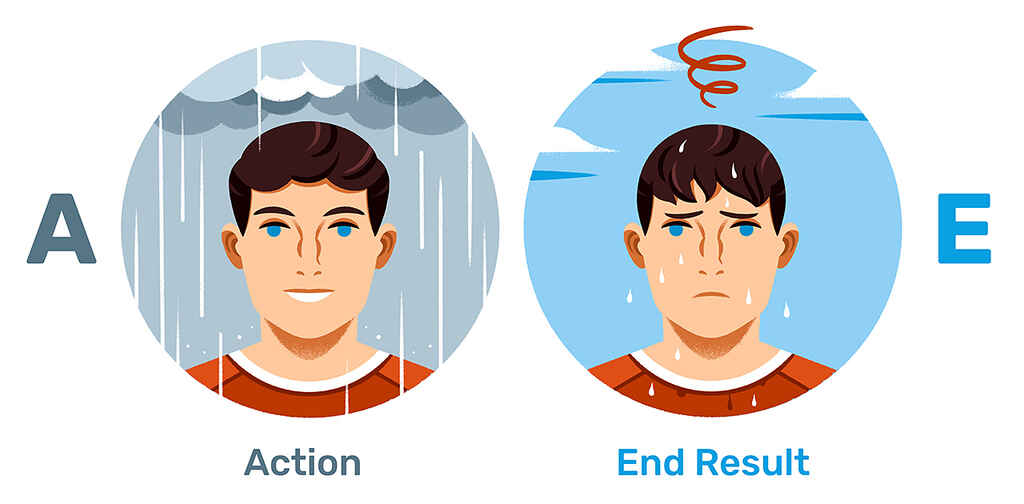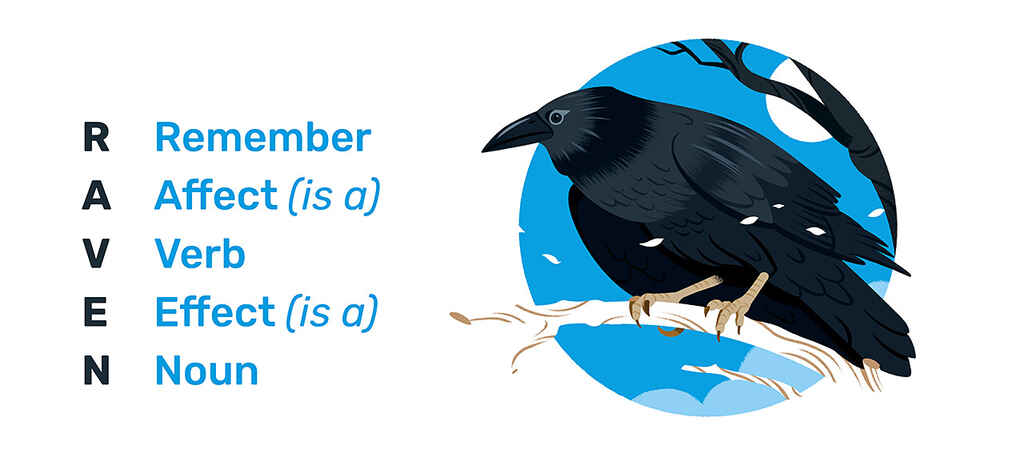Blog • Perfecting your Craft, Book Marketing
Last updated on Oct 14, 2025
Affect vs. Effect: How To Always Pick the Right Word
Martin Cavannagh
Head of Content at Reedsy, Martin has spent over eight years helping writers turn their ambitions into reality. As a voice in the indie publishing space, he has written for a number of outlets and spoken at conferences, including the 2024 Writers Summit at the London Book Fair.
View profile →Affect and effect are homophones (words that sound alike) that are often confused, but have different meanings. Affect is a verb, or an action, that means “to impact or cause change.” On the other hand, effect is a noun that refers to a result or outcome. "Affect" can also be a noun in some situations, while "effect" can likewise also be used as a verb, but you'll see this less commonly.
Even if you’re a card-carrying member of the grammar police, the words affect and effect are easily confused. To clear the haze, this post will help you lock in the meaning of these two words with a few simple memory tricks! (Plus, we'll look at some exceptions to our definitions.)
When do you use "affect?"
First of all, let’s look up the most common dictionary definitions and see if they can affect your ability to remember what the word means!
Affect (verb)
To affect is to produce a physical effect or change through action. For example:
- The wild storm affected the town.
- The test score affects your GPA.
It can also be to produce a mental effect or move someone’s emotions. For instance:
- Tommy’s heartfelt words affected Maisy.
- Music always affects her mood.
Lastly, affecting can mean pretending to be feeling or thinking something.
- Despite his panic, Mo affected a calm demeanor.
- Through her rage, Stella affected a smile.
To put a fine point on it, "affect" is usually something that happens to the subject or object of a sentence.
Literary Examples
For some highbrow context, let’s take this quotation from Virginia Woolf’s To The Lighthouse:
"Let us enjoy what we do enjoy," he said. His integrity seemed to Mrs Ramsay quite admirable. He never seemed for a moment to think, But how does this affect me?
— Virginia Woolf, To The Lighthouse
In contrast, the speaker in this excerpt is assuring us that their emotional state is not "affected" negatively or positively:
“I do assure you, that the news does not affect me either with pleasure or pain. I am glad of one thing, that he comes alone; because we shall see the less of him. Not that I am afraid of myself, but I dread other people’s remarks.”
— Jane Austen, Pride and Prejudice
When should you use "effect?"
If you mistake the meaning of certain words, it can have a detrimental effect on people’s ability to understand what you mean. With that in mind, let’s hit some quick definitions:
Effect (noun)
An effect is a change brought on by a cause or event.
- Years of guitar playing had the effect of toughening her hands.
- Doing pushups will have the effect of making you stronger.
It can also be the result of an action.
- Her spell had no effect.
- His voice has a calming effect on animals.
Literary Examples
In Orwell’s classic dystopian novel, 1984, the narrator describes how a changing (or intoxicating) effect is caused by wine — or should be, were it not “disappointing.”
“For some reason he had always thought of wine as having an intensely sweet taste, like that of blackberry jam and an immediate intoxicating effect. Actually, when he came to swallow it, the stuff was distinctly disappointing.”
— George Orwell, 1984
Whereas in this excerpt from The Lord of The Rings, we can see that the action of being stabbed results in Frodo finding that his sense of perception is stronger than ever.
“Though he had been healed in Rivendell of the knife-stroke, that grim wound had not been without effect. His senses were sharper and more aware of things that could not be seen.”
— J. R. R. Tolkein, The Lord of the Rings
Now that we know what affect and effect both mean, let’s find a way to never mix them up again.
3 ways to remember Affect versus Effect
We’ve found that the ultimate solution to getting their differences memorized permanently is to find and use simple mnemonics — hooks that let us visualize something we want to remember. So try one of these on for size:
1. Action and End Result
A(ffect) is for Action; E(ffect) is for End result.

2. The RAVEN Method
Remember: Affect is a Verb and Effect is a Noun

3. Accident & Emergency
A&E: When you’re Affected by an Accident, the Effect is an Emergency.

With these tricks in your back pocket, you’ll never again mistake these two words. Well, almost never — as we’re about to discover.
Annoying exceptions to the rule
Just as the “I before E except after C” trick doesn’t apply to words like freight and sleight — there are exceptions to the affect/effect rule. You may be disappointed to hear that sometimes:
- affect can be a noun; and
- effect can be a verb.
These forms of affect and effect are certainly less common than the definitions used above, but they’re still worth knowing.
Affect (noun)
An affect can be the physical manifestation of an emotion (e.g., a facial expression).
- His facial affect reflected his inner torment.
- Her affect was flat, devoid of emotion.
It can also be a conscious set of feelings caused by a thought or event.
- She fired him without a hint of affect.
- His affect was positive that day!
Note: When used as a noun, the word affect often takes on a different pronunciation. The emphasis is on the first syllable (AFF-ect) — as in “the actor, Ben Affleck.”
Effect (verb)
To effect is to bring something into being.
- The hero would effect change in the world.
- The reporter’s goal was to effect a difference in the government.
It can also mean accomplishing something, often overcoming obstacles.
- When administered, the vaccine can effect human immunity.
- It was his duty to effect his father’s wishes.
Though, as we mentioned earlier, these usages of affect and effect are rather rare and will likely only pop up in more formal styles of speech and writing.
We hope this post had the effect of helping you understand these intriguing words — and affected you positively.








